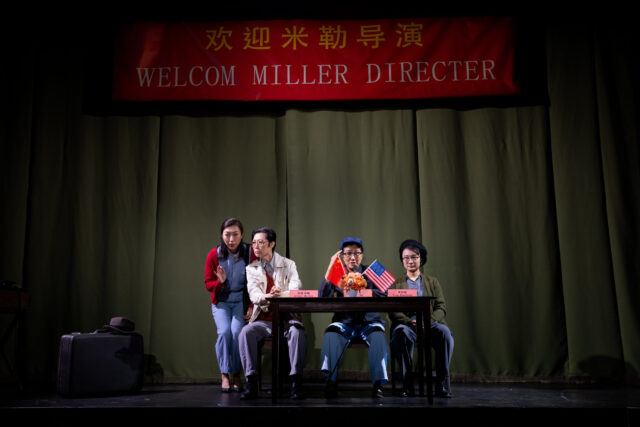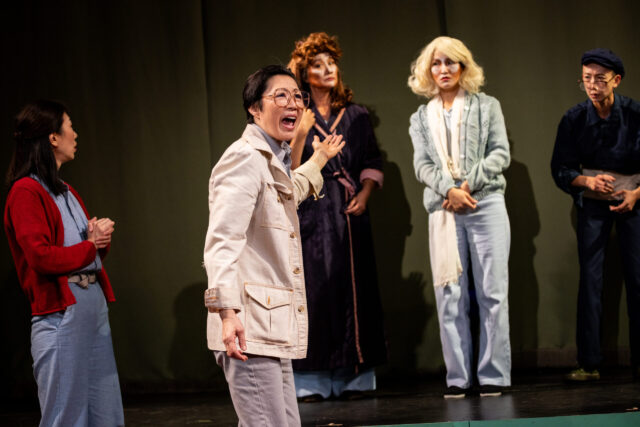
New play explores Arthur Miller’s 1983 experience in China directing Death of a Salesman (photo by Maria Baranova)
SALESMAN 之死
Connelly Theater
220 East Fourth St. between Aves. A & B
Through October 28, $45-$99
www.yzrep.org
www.connellytheater.org
In 1983, Harlem-born playwright Arthur Miller went to Beijing to direct the first-ever Chinese-language version of his 1949 Pulitzer Prize–winning classic, Death of a Salesman, at the prestigious Beijing Renyi Theater (the People’s Art Theater), even though he could not speak a word of Mandarin and most of the cast did not understand English. He was invited by artistic director Cao Yu and actor and future vice minister of culture Ying Ruocheng, who he had met when Miller and his third wife, Austrian photographer Inge Morath, visited China in 1978.
Manhattan-based Yangtze Repertory Theatre, in conjunction with Gung Ho Projects, tells the story of that seminal production in the funny and poignant Salesman之死, which opened tonight at the Connelly Theater.
In his 1984 diary, Salesman in Beijing, Miller wrote, “The truth was that I had no way of knowing if the Chinese authorities were merely interested in using the play for political purposes or if the absence of salesmen in China and the presence of exotic American elements in the play would make it little more than a misunderstood curiosity in Beijing. . . . There would be something impudent in speaking of Chinese isolation from the world rather than the world’s from China were it not that she herself now recognizes modernization as her first priority, and that means taking what she finds useful from the West. In the theater and other arts, however, the decade of the Cultural Revolution completed her total break with quite literally everything that was going on beyond her boundaries and indeed from her own past accomplishments.”
Jeremy Tiang’s hundred-minute Salesman之死 was inspired by Miller’s memoir and interviews with original company members as well as Shen Huihui, the Peking University professor who was hired by Ying to serve as interpreter despite her total lack of experience as a translator. He had chosen her because she could speak English and had written her dissertation on Death of a Salesman. Shen (Jo Mei) serves as the narrator of the play, occasionally directly addressing the audience, who are seated around three sides of the stage. Chika Shimizu’s initially spare set features a central platform with chairs; in the back right corner, Xingying Peng operates the surtitles and indicates scene changes by softly banging on her desk. The curtain in front of the main stage eventually opens to reveal the more crowded set for the presentation of excerpts from Renyi’s Death of a Salesman.
Miller (Sonnie Brown) arrives carrying a suitcase, evoking his main character, Willy Loman, who will be portrayed by Ying (Lydia Li). Theater legend Zhu Lin (Sandia Ang) is Willy’s wife, Linda, with Li Shilong (Julia Gu) as Biff, Mi Tiezeng (Claire Hsu) as Happy, and Liu Jun (Hsu) as the woman from Boston. After the first reading, Miller is concerned that it took four hours, the actors spoke way too slowly, and no one is going to be able to make sense of any of it. The cast is more worried that the audience will miss their buses home, thinking that in New York, at least they had the subway, which runs all night long. That comparison is the first of many between East and West, from the use of makeup in theater to the differences between capitalism and communism and the concept of freedom. The cast has no idea what football is (Biff was a high school gridiron star), has trouble deciphering the scene in which Biff catches Willy with his Boston mistress, and doesn’t even know what a traveling salesman or insurance is.

Arthur Miller (Sonnie Brown) doesn’t like what he sees in Chinese version of Death of a Salesman (photo by Maria Baranova)
“In America, they have this thing called ‘insurance.’ People get money for dying,” Shen tells the actors. When Miller explains that Willy’s family might not get any money if it’s proved that he died by suicide, Mi says, “What, so he died for nothing?” Li responds, “Obviously. If you could earn a chunk of money so easily, you’d have people killing themselves all over the place.”
As Miller noted in his diary, “The cast did not seem any more tense than an American one on the first day, but it is still hard to judge the actors’ feelings. One has only their controlled expressions to go by. I am like a deaf man searching their eyes for emotions, which finally I cannot read.”
The most cynical one of all is longtime Renyi designer Huang (Gu), who is upset that Miller has rejected nearly all of his ideas, from costumes, the bedroom, and wigs to lighting, a refrigerator, and the empty space Miller insists must be in the front of the stage for Willy’s memories. “When Willy steps past this wall, he’ll be in his memory,” Shen says to a confused Huang, who steps forward and back several times, declaring, “Really! Reality! Memory! Reality! Memory! Reality! Amazing!” Miller asks, “Is he okay?” Shen replies, “He’s just excited. Renyi plays never have people walking through walls.”
As opening night approaches, more cultural differences arise and just about everyone worries that this undertaking was a big mistake.

Chinese company performs scene from Death of a Salesman in play-within-a-play (photo by Maria Baranova)
The world premiere of Salesman之死 comes at a challenging time, with relations between the United States and China teetering dangerously on the edge. It’s now more than fifty years since President Richard M. Nixon made his historic visit to China, shaking hands with Premier Zhou Enlai, and forty years since Renyi staged Death of a Salesman. Tiang’s Salesman之死 captures a moment in time when the two nations worked together culturally, resulting in a stirring success. Obie-winning director Michael Leibenluft (I’ll Never Love Again, The Subtle Body) ably guides the show through its multiple languages and doubling of parts, which sometimes requires fast costume changes. The costumes are by Karen Boyer, with lighting by Daisy Long, sound by Kai-Luen Liang and Da Xu, and projections by Cinthia Chen that include clips from Renyi’s production of Cao’s (Ang) 1979 Thunderstorm and the final version of Death of a Salesman. You can watch the full Chinese Death of a Salesman from 1983 here.
Mei (Lunch Bunch, Anatomy of a Suicide) leads a solid and engaging all-female Asian cast as Shen, who is more than just an interpreter; she is a bridge between the US and China, one that we could use today. Shen is a steadying influence amid all the disagreements and misunderstandings among the company and Miller as Tiang (A Dream of Red Pavilions, State of Emergency), who has translated more than two dozen Chinese plays and novels into English, reveals how universal the themes of Miller’s play are, as well as the creation of theater itself.
As Miller wrote in his diary, “The current, post-Mao political line seems to come down to ‘Enrich Yourselves!’ Has the moment arrived when capital must be accumulated in China, whatever the cost? Salesman is fundamentally related to this situation. Willy Loman fell off the horse reaching for the brass ring, but he was deep in the game everyone else was playing.”
Salesman之死 is an enriching experience, no matter one’s cultural heritage.
[Mark Rifkin is a Brooklyn-born, Manhattan-based writer and editor; you can follow him on Substack here.]